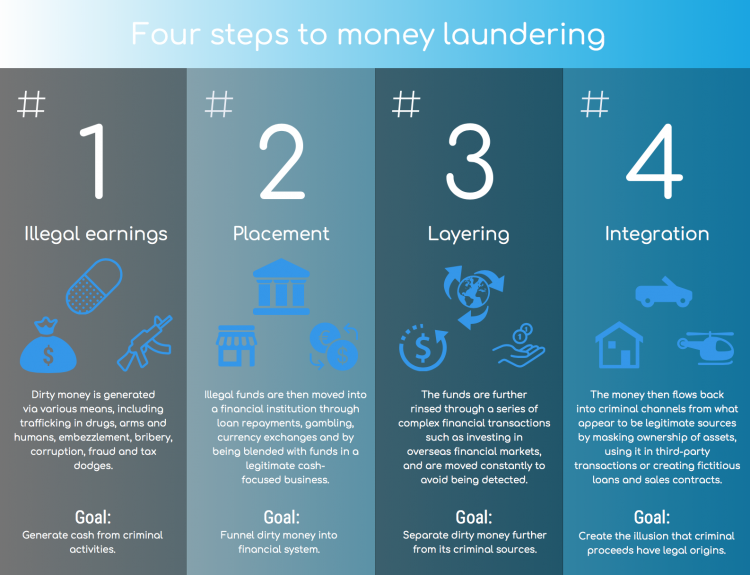A lot of lawyers and accountants in pulp fiction are happy to help criminals turn dirty money into clean cash.
But real-world money laundering is often a case of life imitating art. Part 2 of Peter German’s report on money laundering in B.C. calls out lawyers and accountants for being cogs in B.C.’s money laundering machine. German was not the first to highlight this link.
The Financial Transactions and Reports Analysis Centre of Canada (Fintrac) issued an alert last summer warning of the role financial and professional service providers play in Canada’s intricate money laundering economy.
While it would be absurd to tarnish all accountants, lawyers and bankers as money launderers, those professions are integral to the dirty money industry.
And that makes sense, given their know-how, ability and access to tools needed to launder money.
It is difficult, however, to pinpoint how much of the professional services sector is funded by money laundering or how many firms would disappear if money laundering were wiped out tomorrow. However, lawyers were defendants in 15% of the Fintrac report’s money laundering cases and represented 25% of its professional money laundering service providers. Lawyers were the second most likely profession to be charged with money laundering after entrepreneurs.
It is unclear whether professional service providers are knowingly participating in money laundering or whether they are the unwitting accomplices. Both the Fintrac report and Simon Fraser University professor of criminology Robert Gordon say it’s a bit of both.
“I think initially they were wilfully turning a blind eye to what was going on and not wanting to rock the boat because they and their clients would have been threatened,” said Gordon. “All around it was a win-win.”
He added that many professional service providers didn’t peg money laundering as the cause of a surge in business until it was too late.
“Then it becomes a question of ‘Who’s going to put the brakes on?’ And the answer is ‘Nobody.’”

Lawyers occupy a special place in the province’s money laundering economy because they are exempt from Fintrac reporting requirements due to solicitor-client privilege. Lawyers in B.C. can act as realtors without any of the associated scrutiny or oversight. That, according to the report, makes them very useful to money launderers.
“Lawyers are the ‘black hole’ of real estate and of money movement generally,” said the Fintrac alert. “With no visibility by law enforcement on what enters and leaves a lawyer’s trust account, many investigations are stymied.”
While lawyers are able to fly under Fintrac’s radar, accountants are required to report to the federal government. However, they are one of the most under-scrutinized, underreported groups in Fintrac’s reporting system. Only a handful of accounting firms have reported any transaction to Fintrac, according to Christine Duhaime, a Vancouver-based lawyer focused on fighting money laundering and financial crime.
But Duhaime said most professional service providers involved in money laundering, including lawyers and accountants, do so unknowingly.
According to the Fintrac alert, lawyers and accountants engaged in money laundering often own or are associated with trading companies or money services firms. They use their networks and organizational infrastructure to facilitate money laundering and provide a veneer of legitimacy to criminal organizations.
Bankers and financial service providers have also had money laundering run-ins with the law. In the U.S., HSBC (NYSE:HSBC) was forced to pay a record fine of $1.92 billion in 2012 for laundering drug cartel money. Media reports say a report delivered to Finance Minister Bill Morneau that was not meant for public dissemination found “significant” levels of non-compliance and other problems with six out of the nine top Canadian banks.
Some companies in the sector have allowed their services to be exploited for illegitimate purposes. Some companies co-operate fully with criminals; others turn a blind eye to the fact that they are serving criminals, according to the Fintrac alert.
However, a crackdown on money laundering would have little impact on the professional services sector’s overall profitability, said Jock Finlayson, executive vice-president and chief policy officer of the Business Council of British Columbia.
“I don’t think money laundering is a huge factor driving business for lawyers or accountants or financial institutions,” Finlayson said. “Obviously it’s had some impact, but a far bigger factor is the real estate market. If we see a drop in housing starts as well as home-renovation spending, these are the things that will really affect the professional service suppliers.”
Gordon, however, disagreed.
He said that if money laundering funds dried up tomorrow there would be a noticeable drop in professional and financial service providers’ sales.
Regardless of how big organized crime’s role is in B.C.’s financial services sector, it’s clear that parts of the industry are benefiting from it.
The Fintrac alert proposes that money laundering would not exist in the same way if it weren’t for these professional service providers.
“It is difficult, and often impossible, to launder large amounts of money without the assistance, witting or otherwise, of financial or professional intermediaries, including company formation agents, accountants and lawyers.”




